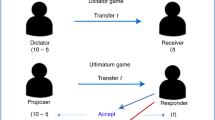Abstract
Although beliefs about the effect of affirmative action are widespread, behavioral responses to affirmative actions (from beneficiaries and non-beneficiaries) cannot easily be understood without experimental evidence. In this chapter I review the findings from the experimental literature on two key questions: can affirmative action increase representation without harming efficiency? Are affirmative action beneficiaries penalized by others? The findings highlight that beneficiaries respond to affirmative action as it changes their probability of participating in competitions and it changes their effort level. But the efficiency cost of affirmative action to the society, if any, is small, as affirmative action enhances the participation of highly performing individuals, who would have not participated otherwise. Moreover, beneficiaries do not suffer from backlash from non-beneficiaries. The negative societal impact of affirmative action is therefore likely to be limited.
Similar content being viewed by others
References
Balafoutas L, Sutter M (2012) Affirmative action policies promote women and do not harm efficiency in the laboratory. Science 335(6068):579–582
Balafoutas L, Davis BJ, Sutter M (2016) Affirmative action or just discrimination? A study on the endogenous emergence of quotas. J Econ Behav Organ 127:87–98
Banerjee R, Gupta ND, Villeval MC (2018) The spillover effects of affirmative action on competitiveness and unethical behavior. Eur Econ Rev 101:567–604
Calsamiglia C, Franke J, Rey-Biel P (2013) The incentive effects of affirmative action in a real-effort tournament. J Public Econ 98:15–31
Coate S, Loury G (1993) Antidiscrimination enforcement and the problem of patronization. Am Econ Rev 83(2):92–98
Deshpande A, Weisskopf TE (2014) Does affirmative action reduce productivity? A case study of the Indian railways. World Dev 64:169–180
Dorrough AR, Leszczy’nska M, Barreto M, Glöckner A (2016) Revealing side effects of quota rules on group cooperation. J Econ Psychol 57:136–152
Dulleck U, He Y, Kidd MP, Silva-Goncalves J (2017) The impact of affirmative action: evidence from a cross-country laboratory experiment. Econ Lett 155:67–71
Fryer RG, Loury GC (2005) Affirmative action and its mythology. J Econ Perspect 19(3):147–162
Heilman ME, Block CJ, Stathatos P (1997) The affirmative action stigma of incompetence: effects of performance information ambiguity. Acad Manag J 40(3):603–625
Ip E, Leibbrandt A, Vecci J (2020) How do gender quotas affect workplace relationships? Complementary evidence from a representative survey and labor market experiments. Manag Sci 66(2):805–822
Kölle F (2017) Affirmative action, cooperation, and the willingness to work in teams. J Econ Psychol 62:50–62
Maggian V, Montinari N (2017) The spillover effects of gender quotas on dishonesty. Econ Lett 159:33–36
Niederle M, Segal C, Vesterlund L (2013) How costly is diversity? Affirmative action in light of gender differences in competitiveness. Manag Sci 59(1):1–16
Petters LM, Schroeder M (2020) Negative side effects of affirmative action: how quotas lead to distortions in performance evaluation. Eur Econ Rev 130:103500
Schotter A, Weigelt K (1992) Asymmetric tournaments, equal opportunity laws, and affirmative action: some experimental results. Q J Econ 107(2):511–539
Author information
Authors and Affiliations
Corresponding author
Editor information
Editors and Affiliations
Rights and permissions
Copyright information
© 2022 Springer Nature Singapore Pte Ltd.
About this entry
Cite this entry
Gille, V. (2022). Experimental Evidence on Affirmative Action. In: Deshpande, A. (eds) Handbook on Economics of Discrimination and Affirmative Action. Springer, Singapore. https://doi.org/10.1007/978-981-33-4016-9_37-1
Download citation
DOI: https://doi.org/10.1007/978-981-33-4016-9_37-1
Received:
Accepted:
Published:
Publisher Name: Springer, Singapore
Print ISBN: 978-981-33-4016-9
Online ISBN: 978-981-33-4016-9
eBook Packages: Springer Reference Economics and FinanceReference Module Humanities and Social SciencesReference Module Business, Economics and Social Sciences




